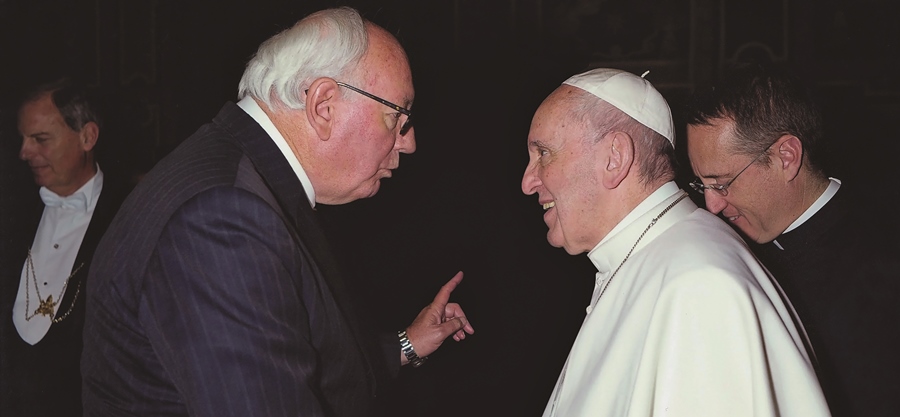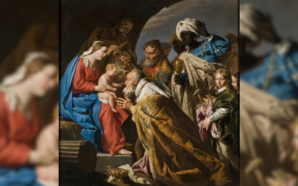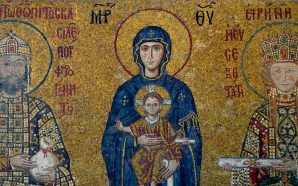The COVID-19 pandemic gives John McCarthy QC an added dimension to his anti-slavery work but he remains sharply focused on the bigger picture.
The chair of Sydney Archdiocese’s Anti-Slavery Taskforce and member of the Australian Catholic Anti-Slavery Network, like Pope Francis, wants to see the eradication of slavery globally.
Mr McCarthy, Australian Ambassador to the Holy See from 2012 to 2016, was in Rome when Cardinal Jorge Mario Bergoglio became Pope Francis in 2013 and has been inspired by his strong stand against slavery and human trafficking.
“The greatest single anti-slavery advocate in the world is Pope Francis, and he had big experience in South America about all of this, because Buenos Aires (Argentina) is a hub of trafficking,” he said.
He said the Pope was largely responsible for bringing about the United Nations’ Sustainable Development Goal 8.7 adopted in 2015 related to eliminating forced labour, human trafficking, child labour and modern slavery.
“On that, he has moved the world to the stage where what his argument is, and what (the Australian Catholic Anti-Slavery Network and Anti-Slavery Taskforce) are all about, is to try and take this out in our generation,” Mr McCarthy said.
“What the Pope doesn’t want is for the young people and the children of today to be slaves tomorrow; he wants it to end now, and he wants people to commit to ending it now …”
Mr McCarthy said the coronavirus pandemic raised particular concerns on that front despite the fact Australia had “very little forced labour and human trafficking”.
“A lot of it (in Australia) is tied up with prostitution and a lot of it is tied up with agricultural work and seasonal picking, and with people from the South Pacific who are here on temporary working visas,” he said.
“There’s something like 250,000 people over here at the moment …
“These are areas where there is very significant slavery-like conditions under which people have to work, and people are deprived of wages …
“But, in a wider way, we’re very concerned because we have a number of cases of people in this area who have been totally thrown out of work.
“There’s no picking going on at the moment and, while they’ve got some money, we’re supporting the Government giving them temporary cover both in terms of money and health services to look after them, because most of them don’t have the fare back to their own country, if you could in actual fact go.”
Travel restrictions made it difficult for temporary workers to return home.
Another concern, not only for anti-slavery groups but for all social justice and welfare organisations, to maintain pressure in this area when public attention was so focused on the COVID-19 pandemic.
Mr McCarthy welcomed a recent statement of support from Australian Catholic Bishops Conference Archbishop Mark Coleridge for ACAN, which was launched late last year.
“The formation of the Australian Catholic Antislavery Network was a major achievement within the Church in Australia and far beyond,” Archbishop Coleridge said in the statement.
“ACAN has done much in a short time, working to ensure a high level of co-operation and co-ordination among Australian Catholic entities in dioceses, as well as education, health and aged care, welfare, finance and investment in response to the Modern Slavery Act.
“Catholic entities participating in ACAN are strongly positioned to respond effectively to the statutory requirements in the Modern Slavery Act with a comprehensive risk management program.
“Australia can be a leading force in the Catholic world in seeking to eradicate modern slavery, human trafficking and forced labour.
“That is the purpose of the Sustainable Development Goal (SDG) 8.7, which was inspired by Pope Francis.”
Victims of modern slavery in Australia include those trapped in forced labour, debt bondage, forced marriage or human trafficking.
Mr McCarthy said the Catholic Church in Australia had more than 40 entities required to file modern-slavery statements because of the size of their operations.
“After the Commonwealth Government, and NSW, Victoria and Queensland, the next largest entity in Australia is the Catholic Church,” Mr McCarthy said.
“The Catholic Church is the biggest employer, outside of the public sector, in the country …”
Mr McCarthy said the Church was at the cutting edge in the anti-slavery movement.
“We have better programs … than either the universities or the Government at the moment, and that’s acknowledged across the board,” he said.
“It’s not often that you’re having a conversation where someone is telling you that the Catholic Church is on the front foot, but this is one.”
Mr McCarthy said the key to fighting slavery was “you’ve got to go after who’s got the money”.
“Most (initiatives) in relation to slavery that you would hear about is in relation to trying various levels of victim support,” he said.
“That is enormously important and it absorbs 90-plus per cent of the money or any effort that is happening in this area, but it won’t eradicate slavery.
“You’ve got to break the people who make money out of it, and that’s the supply chains.
“And that means you don’t buy their goods and services.
“The Catholic Church is in the fortunate position; we don’t even have to think that hard about this, because it’s a fundamental principle of Catholic social teaching that you do not – you do not – engage in the exploitation of other people, and the second one is that you don’t give money or resources or support to people who do.”
By Peter Budgen. Reproduced with permission from The Catholic Leader, the online news publication of the Archdiocese of Brisbane.








